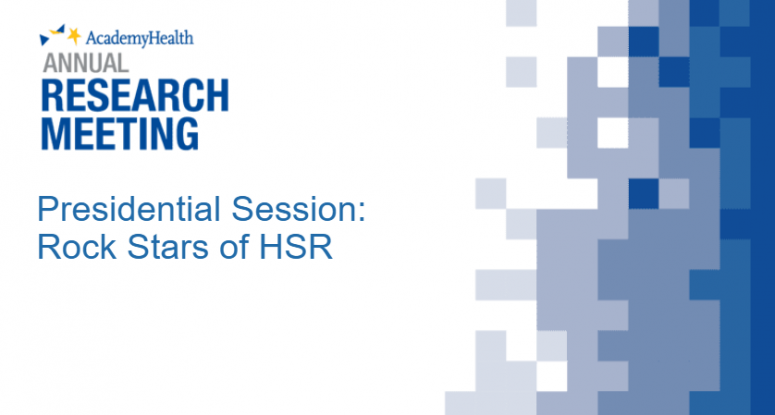
Health services research (HSR) and health policy have never been more important. Our work can be challenging under the best of circumstances but no one could have foreseen where we stand today.
We are operating in an era of anti-science unlike any that I have ever seen.
We have had to adapt to the unprecedented overlay of the COVID-19 pandemic, with few guideposts.
Given COVID-19’s politicization, I have gone from wanting to proudly wear a T-shirt that says “I’m an epidemiologist…now you know what I do,” to questioning whether it’s safe to wear it in public.
As I have struggled to adjust and lead in this context, my mind has harkened back to Elizabeth Kubler Ross’s stages of death and dying that apply to human response in so many circumstances: denial, anger, bargaining, depression, and acceptance.
As health services researchers and healthcare professionals, I think we skipped denial altogether, as we were often in the frontlines of COVID-19’s realities.
Anger was not with the coronavirus but with profound gaps in organized response and resources – and the utterly frustrating denial of evidence by some.
Bargaining has many expressions in daily life – in how we lower the risks for ourselves and those with whom we work and live – through mask use, social distancing, or deciding whether to get a haircut. Everyone is trying to reclaim some sense of control in this new “normal,” even though it’s not clear what post-COVID-19 normal looks like or if a post-COVID-19 normal is possible.
Depression speaks for itself. I recall a month or so ago when every person I spoke with talked about how they just struggled to get out of bed, couldn’t concentrate on work or school, and were tired all the time.
I was just starting to see a transition to acceptance of our new lot in life when George Floyd was killed and outrage, anger, and pain boiled over across the country and then across the globe.
In the weeks after, I read a number of organizational, academic, corporate, and personal missives about systemic racism and the need to act. Some were heartfelt and meaningful, and others well-intentioned but missed the mark. For others still, the silence has been described as “deafening.” But what I am most concerned about is what comes next, as the number of protests declines and the media moves on, and people try to go back to “work as usual.” But going back to “normal” would be going back to the same problems that fed the outrage in our streets. Instead, we must define, build, and sustain a new normal together.
It is incumbent on all of us to fight against the human urge to find old patterns that seemed comfortable and known, but harmed whole swaths of our friends, family, colleagues, and communities. We must serve not only as individual agents of change at work, at school, and at home, but as a community dedicated to building a diverse workforce and combating systemic racism at every level. The Board has taken on this challenge as a group, in partnership with AcademyHealth, in our home institutions and in our communities. We invite you to join us.
[For this address] I was asked to discuss where the field is going and the challenges we face. I started with the challenges because I wake up with them every day as many of you do, and the lens for my views are as an “embedded researcher.” While I am a UCLA professor of public health and medicine, my full-time job is leading a large HSR&D center in the VA healthcare system.
As embedded researchers, we become experts in the system we study, collaborate with system leaders and frontline providers, and – when we’re really doing our jobs – with patients and their families, to identify problems where our work can inform evidence-based solutions. Our partnerships help us generate evidence that can be more rapidly implemented into practice to then improve outcomes for the veterans we serve.
The National Academy of Medicine describes embedded researchers as central to the proposition of learning healthcare systems, where “science, informatics, incentives and culture are aligned for continuous improvement and innovation.” AcademyHealth has made the case that the success of the health services research workforce increasingly depends on exposure to delivery systems to ensure its relevance and future funding. It should come as no surprise that a rapidly growing segment of AcademyHealth members hail from integrated delivery systems. We must commit to advancing work in this area.
In a similar address at an earlier ARM, one of my predecessors anchored his views of the future of health services research in the Game of Thrones tagline: “Winter is Coming,” (little did he know!). My current analogy is from Hamilton: “If there’s a fire you’re trying to douse, you can’t put it out from inside the house.”
To me, the “house” reflects our academic silos, whether in a university or healthcare system, doing research but never walking down the hall to see what problems are burning the place down. We cannot afford to be complacent about the role of HSR in health care delivery or policy without directly engaging delivery system leaders and policymakers. Our success relies on our individual and collective ability to engage others in implementing and spreading research evidence into routine practice and policy and demonstrate HSR’s return on investment.
When it takes a decade to be able to write in the scientific language necessary to publish in the nation’s top medical journals, and the same amount of time to lose our ability to communicate science effectively to C-suite executives, legislators, or our neighbors, we have a problem.
The work of AcademyHealth and its members in helping us solve this and other problems could not come soon enough.